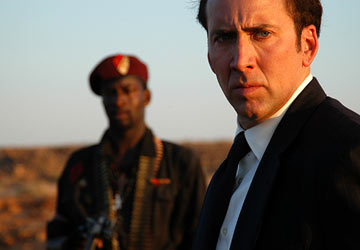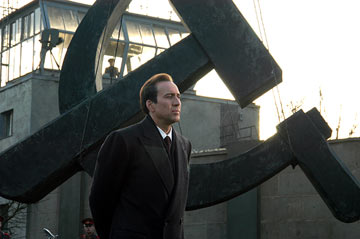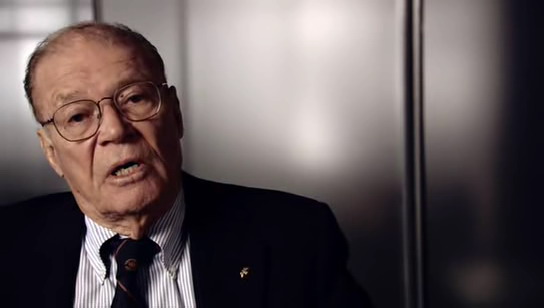 “They say that ‘evil prevails when good men fail to act.’ It should just be ‘evil prevails.’” Andrew Niccol’s Lord of War, which I saw earlier this week, is basically an angrier, more sardonic kid brother to The Constant Gardener. But, while Gardener is probably a better-made work of cinema, I actually enjoyed myself more at Niccol’s film. At once a character study of an amoral arms dealer, a bitter tirade againt third world exploitation, and a dark comedy that may run too sour for some tastes, Lord of War is an above-average entrant in the satirical muckraking tradition. And its occasional preachiness is leavened by Nicolas Cage’s consistently-amusing and deftly-written performance, most of which is voiceover, at the center of the film.
“They say that ‘evil prevails when good men fail to act.’ It should just be ‘evil prevails.’” Andrew Niccol’s Lord of War, which I saw earlier this week, is basically an angrier, more sardonic kid brother to The Constant Gardener. But, while Gardener is probably a better-made work of cinema, I actually enjoyed myself more at Niccol’s film. At once a character study of an amoral arms dealer, a bitter tirade againt third world exploitation, and a dark comedy that may run too sour for some tastes, Lord of War is an above-average entrant in the satirical muckraking tradition. And its occasional preachiness is leavened by Nicolas Cage’s consistently-amusing and deftly-written performance, most of which is voiceover, at the center of the film.
Cage plays Yuri Orlov, a Ukrainian immigrant to Brighton Beach in the 1980s who, after an inadvertent run-in with the Russian mafia at a local cafe, realizes that guns, like the funeral business, is pretty much always a growth industry. Enlisting his more sensitive sibling (Jared Leto) as muscle and back-up (a.k.a. his “brother in arms”), Orlov embarks on a quest to arm the world and make mad bank doing it. Along the way, he woos a trophy wife (Bridget Moynahan), attracts the ire of both a more-established (and ostensibly more “moral” — he has politics as well as money in mind) rival (Ian Holm) and an idealistic, go-getter federal agent (Ethan Hawke), scavenges his former homeland after the fall of the USSR (essentially a free-for-all fire sale of tanks, munitions and ordnance), and finds himself in the company of increasingly more sadistic and unsettling despots (notably Eamonn Walker, doing a variation on Liberia’s Charles Taylor.)
 What keeps Lord of War moving at a brisk clip is Cage’s deadpan voiceover, which boasts an impressive arsenal of witty bon mots. Says Orlov of his mission, “There are over 550 million firearms in worldwide circulation. That’s one firearm for every twelve people on the planet. The only question is: How do we arm the other 11?” Of his clients in the ’80s: “I never sold to Osama bin Laden. Back then, he was always bouncing checks.” Of his (brief) attempt to go on the up-and-up: “Thank God there are still legal ways to exploit developing countries.” In short, if your sense of humor runs toward the dark and twisted, Niccol’s tightly-written script pays dividends.
What keeps Lord of War moving at a brisk clip is Cage’s deadpan voiceover, which boasts an impressive arsenal of witty bon mots. Says Orlov of his mission, “There are over 550 million firearms in worldwide circulation. That’s one firearm for every twelve people on the planet. The only question is: How do we arm the other 11?” Of his clients in the ’80s: “I never sold to Osama bin Laden. Back then, he was always bouncing checks.” Of his (brief) attempt to go on the up-and-up: “Thank God there are still legal ways to exploit developing countries.” In short, if your sense of humor runs toward the dark and twisted, Niccol’s tightly-written script pays dividends.
Whatsmore, unlike Gardener, which at times seemed to wallow in its piety, Lord of War cleverly juxtaposes its increasing contempt for Orlov’s vulturine livelihood against Cage’s natural amiability and his character’s rising fortunes (a la Richard III.) So, even as the story grows blacker, the audience has no place to go. We’re forced to empathize, at least to some degree, with Orlov’s attempt to achieve his own sick version of the American Dream on the backs of the Third World. Which, in the end, is Niccol’s point — We, too, are complicit in this story. Admittedly, the movie drops the ball somewhat in the last reel and veers too far toward polemic. (Of course, the same can be said of many quality film satires, including Catch-22 and Bamboozled.) But, until then, Lord of War is a disarmingly breezy jaunt through a highly-armed world and proof positive that, occasionally in “message movies,” honey catches more flies than vinegar.

